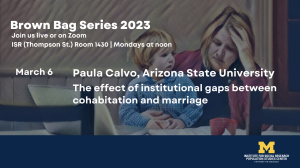Presented By: Population Studies Center
PSC Brownbag Series: The effect of institutional gaps between cohabitation and marriage
Paula Calvo

The PSC Brown Bag Series runs live and on Zoom this year, Mondays from 12 to 12:50 p.m.
Paula Calvo of Arizona State University presents:
The effect of institutional gaps between cohabitation and marriage
This paper examines the effects of institutional differences between marriage and non-marital cohabitation―in dimensions such as child custody laws and property division rules upon separation―on household formation, individual's welfare and child human capital. I first show that, conditional on observable characteristics, cohabiting women have higher labor supply and higher separation rates than married women. They also raise children with lower cognitive outcomes. To rationalize these facts, I model the individuals' life-cycle problem within an equilibrium marriage market framework that features the choice between marriage and cohabitation. I estimate the model on U.S. household data. The results indicate that low-educated cohabiting women receive a lower share of the household's resources than low-educated married women. Moreover, their children accumulate less human capital compared to those born to low-educated married women, explained by lower maternal time investments and higher separation rates between cohabiting couples. In counterfactual simulations, I equalize child custody for married and unmarried parents upon separation. This policy improves the welfare of low-educated cohabiting women. The equilibrium effects are critical for this result: While this policy reduces the welfare of low-educated cohabiting women under the baseline marriage market equilibrium (by weakening their parental rights at separation), in the new equilibrium they are compensated with a higher share of the household's resources. This policy also contributes to closing the human capital gap between children born to low-educated cohabiting and married women.
Join us in person at ISR (Thompson Street) Room 1430.
Or online: Join Zoom Meeting
https://umich.zoom.us/j/95418610585?pwd=Z0cvdkF1T0R2cG1lRDEvVmlnbVdlZz09
Paula Calvo of Arizona State University presents:
The effect of institutional gaps between cohabitation and marriage
This paper examines the effects of institutional differences between marriage and non-marital cohabitation―in dimensions such as child custody laws and property division rules upon separation―on household formation, individual's welfare and child human capital. I first show that, conditional on observable characteristics, cohabiting women have higher labor supply and higher separation rates than married women. They also raise children with lower cognitive outcomes. To rationalize these facts, I model the individuals' life-cycle problem within an equilibrium marriage market framework that features the choice between marriage and cohabitation. I estimate the model on U.S. household data. The results indicate that low-educated cohabiting women receive a lower share of the household's resources than low-educated married women. Moreover, their children accumulate less human capital compared to those born to low-educated married women, explained by lower maternal time investments and higher separation rates between cohabiting couples. In counterfactual simulations, I equalize child custody for married and unmarried parents upon separation. This policy improves the welfare of low-educated cohabiting women. The equilibrium effects are critical for this result: While this policy reduces the welfare of low-educated cohabiting women under the baseline marriage market equilibrium (by weakening their parental rights at separation), in the new equilibrium they are compensated with a higher share of the household's resources. This policy also contributes to closing the human capital gap between children born to low-educated cohabiting and married women.
Join us in person at ISR (Thompson Street) Room 1430.
Or online: Join Zoom Meeting
https://umich.zoom.us/j/95418610585?pwd=Z0cvdkF1T0R2cG1lRDEvVmlnbVdlZz09